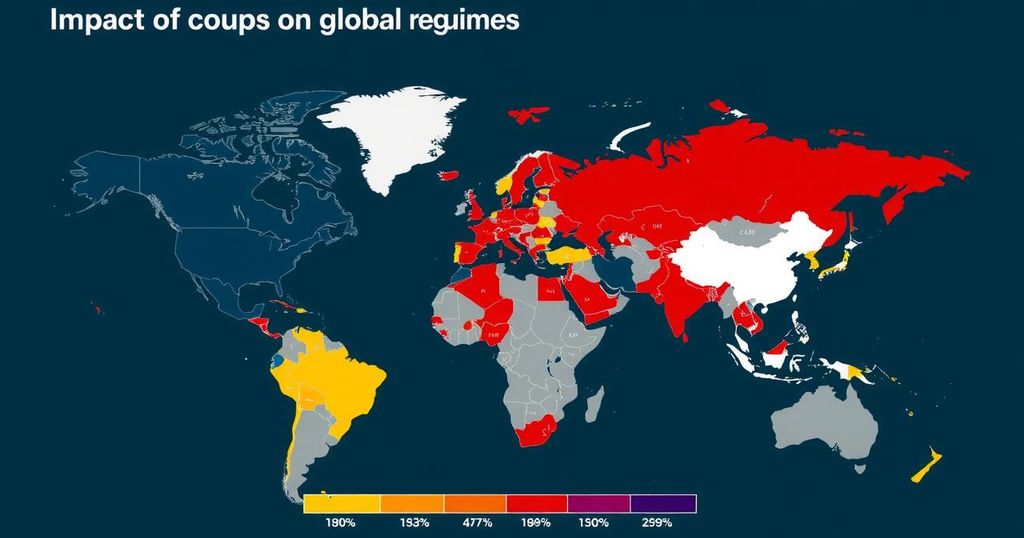Political Upheaval of 2024: A Global Perspective on Coups and Instability
In 2024, several countries faced severe political upheaval due to coups, resulting in violence and instability. Nations such as Bangladesh, Syria, Myanmar, and Haiti illustrate the fragility of political systems amid these struggles, leading to humanitarian crises and exacerbating socio-political conflicts. The situation highlights the pressing need for international attention and intervention.
In 2024, numerous nations experienced political turmoil as coups attempted to overthrow existing governments through both military and political means. This upheaval highlighted the inherent fragility within various political systems globally. States such as Bangladesh, Myanmar, Syria, and Haiti witnessed violent power struggles, with varying degrees of success. However, the aftermath of these changes often led to ongoing instability rather than the promised restoration of peace.
In Bangladesh, widespread protests against Prime Minister Sheikh Hasina’s administration escalated into violence, resulting in over 700 fatalities. The unrest empowered hardline Islamist factions, who began targeting minorities in retaliation. This situation strained Bangladesh’s relations with neighboring India, subsequently raising international concerns about the safety of religious minorities in the region.
Conversely, in Syria, Islamist rebels launched a major offensive, successfully seizing Aleppo, a pivotal city long held by the Syrian government. The government, backed by Russian and Iranian support, struggled to maintain its grip on the remaining territories, combating intense opposition from rebel factions.
Myanmar faces a devastating civil war in the wake of a military coup that ousted Nobel laureate Aung San Suu Kyi. The conflict has resulted in thousands of deaths and significant displacement, though some rebel groups are tentatively exploring peace negotiations mediated by China.
Meanwhile, Haiti’s situation has deteriorated significantly owing to rampant gang violence, leading to about 80% of the capital, Port-au-Prince, being under gang control. Despite attempts by international police forces to restore order, the violence has intensified, severely impacting civilians, particularly women and children, prompting a significant refugee crisis.
In addition to these countries, the Democratic Republic of Congo continues to endure more than three decades of conflict, primarily fueled by rival rebel factions. The Tutsi-led M23 group has exacerbated humanitarian crises, with the international community expressing concern over the alarming displacement rates in North Kivu province.
Overall, the coups and subsequent upheaval across these regions reflect a troubling trend of instability, raising critical questions about governance, human rights, and international responsibility in conflict resolution.
The article examines the significant political upheaval and violent attempts to overthrow governments in various nations in 2024. It discusses the implications and consequences of these coups, suggesting that instead of leading to peace and stability, they often exacerbate violence and instability within regions. The situations in countries such as Bangladesh, Syria, Myanmar, Haiti, and the Democratic Republic of Congo are specifically highlighted to underscore the challenges faced by these nations amid renewed conflicts and worsening humanitarian crises.
In summary, the political turmoil of 2024 has illustrated a stark reality across multiple nations where attempts at regime changes through coup d’états have often resulted in escalated violence and societal instability. The situations observed in Bangladesh, Myanmar, Syria, Haiti, and the Democratic Republic of Congo exemplify a trend where promised reforms and peace yield little more than chaos and suffering, calling for urgent international engagement and resolution strategies to support affected populations. The ramifications of these conflicts not only affect individual nations but have broader implications for regional security and international relations.
Original Source: www.news18.com




Post Comment